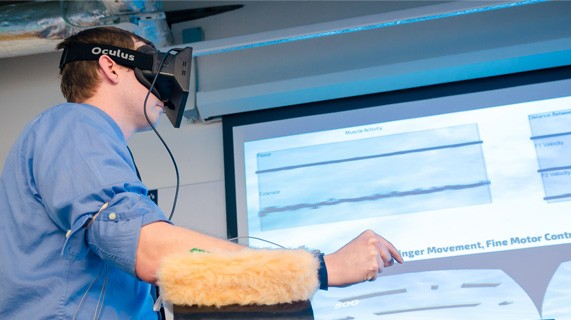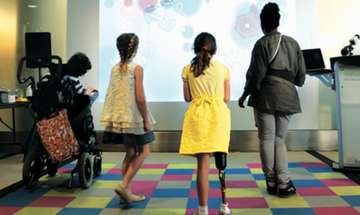Oculus Rift Delivers Virtual Therapy for Stroke Patients
 images: ISGTW.ORG
images: ISGTW.ORG Four University of Washington students have developed six games that assist in the therapy of stroke patients and provide patients with real-time feedback. The vHAB concept, which won the TechSandbox competition at UW, uses the Oculus Rift to deliver the virtual experience.
A virtual reality game that uses Oculus Rift to deliver real-time feedback to stroke patients undergoing therapy, has won the TechSandbox competition at the University of Washington's Center for Sensorimotor Neural Engineering (CSNE) in Seattle, Washington. Team vHAB, the winners of the competition, successfully created six games that stroke patients could play while undergoing therapy. The team that developed the games consists of four University of Washington students: two graduate students in bioengineering, an undergraduate in neurology and behaviour, and an undergraduate in bioengineering.
Developed by the California-based Oculus VR, the Oculus Rift is a virtual reality headset that allows users to experience virtual worlds while playing games. The device can track every subtle movement of the head, letting users seamlessly experience the virtual reality around them. The headset delivers a stereoscopic 3D view for the user by showing parallel images for each eye, mimicking the way people perceive the real world around them. The device provides about 100° field of view, which extends the virtual reality beyond the user's peripheral vision. The Rift is very comfortable and light, and can easily be used for hours to play games and explore virtual environments.

This year's TechSandbox competition at the University of Washington saw five teams of undergraduate and graduate students of bioengineering, neurobiology, biorobotics, and mechanical engineering create new concepts in sensorimotor neural engineering. The winning concept, vHAB, uses sensors to detect muscle activity and to assess and speed up motor recovery in stroke patients. All the data is delivered into medical records that physicians can use to measure recovery.
The Techsandbox competition was initially launched to engage students and provide them with an opportunity to get some hands-on experience in their chosen field, but it was received so well in its first year that it now takes place as part of a course at the department of bioengineering.

 SEND INQUIRY
SEND INQUIRY








